A FEBRE EDUCACIONAL SUL COREANA, PASSADO E PRESENTE: O PARADOXO ENTRE A TRADIÇÃO E O DESENVOLVIMENTO
Resumo
O artigo analisa o fenômeno da febre educacional sul-coreana, no qual é observado o processo de desenvolvimento conjunto dos setores econômico e educacional. Tal processo demonstra que o comprimido desenvolvimento, rápido crescimento econômico, liberalização e globalização, foram responsáveis pela criação de um ambiente altamente competitivo no país. Neste contexto, a febre educacional, caracterizada principalmente pelos elevados gastos com educação suplementar privada, foi fomentada pela competitividade e pronunciado credencialismo, onde se destacar se torna fundamental em um mercado de trabalho inelástico. Apesar da educação ter sido essencial na reconstrução e edificação nacionais, as circunstâncias nas quais se desenvolveu causaram um superaquecimento educacional, que tem apresentado reflexos socioeconômicos negativos, principalmente a respeito da equidade educacional, desigualdade, estratificação e mobilidade sociais.
Referências
AUBERT, Jean-Eric; SUH, Joonghae. Assessment and Lessons. In: CHEN, Derek; SUH, Jooghae (ed.). Korea as a knowledge economy. Washington: WBI, KDI, 2007. Diponível em: https://openknowledge.worldbank.org/bitstream/handle/10986/6755/409300PAPER0KR101OFFICIAL0USE0ONLY1.pdf?sequence=1&isAllowed=y. Acesso em: 18 abr. 2021.
CHANG, Yunshik. Growth of Education in Korea 1910-1945. Bulletin of the Population and Development Studies, [S.I.], n.4, 1975. Disponível em: https://s-space.snu.ac.kr/bitstream/10371/90811/1/2.GROWTH_OF_EDUCATION_IN_KOREA_1910-1945%5DYunshik%20Chang.pdf. Acesso em: 13 abr. 2021.
CHEN, Derek; SUH, Jooghae (ed.). Korea as a knowledge economy. Washington: WBI, KDI, 2007. Disponível em: https://openknowledge.worldbank.org/handle/10986/6755. Acesso em: 21 fev. 2021.
CHOI, Hoon; CHOI, Álvaro. When one door closes: the impact of the hagwon curfew on the consumption of private tutoring in Korea. IEB Paper n.2015/32, 2015. Disponível em: https://papers.ssrn.com/sol3/papers.cfm?abstract_id=2689777. Acesso em: 24 abr. 2021.
CHOI, Jaesung. Private tutoring and education inequality. Paper Study University of Pennsylvania, 2012. Disponível em: https://paa2013.princeton.edu/papers/130384. Acesso em: 23 abr. 2021.
HOLTTINEN, Ella. Stuck in Hel Joseon: The millennial generation’s plight in contemporary South Korea. Department of Sociology, Lund University, 2020. Disponível em: https://lup.lub.lu.se/luur/download?func=downloadFile&recordOId=9017250&fileOId=9017260. Acesso em: 01 maio 2021.
HWANG, Yunhan. Why do South Korean students study hard? International Journal of Education Research, Gwangju, v.35, n.9, 2002. Disponível em: https://www.researchgate.net/publication/222707983_Why_do_South_Korean_students_study_hard_Reflections_on_Paik's_study. Acesso em: 24 abr. 2021.
ISOZAKI, Noriyo. Education, development, and politics in South Korea. In: TSUNEKAWA, Keiichi; YASUYUKI, Todo. Emerging States at crossroads. Singapore: Springer, 2018. Disponível em: https://link.springer.com/chapter/10.1007/978-981-13-2859-6_10. Acesso em: 05 out. 2020.
JOURNAL OF THE GROUP OF 77 AT THE UN. South Korea faces crisis after leaving the developing world. Journal of the Group of 77, [S.I], v.10, 1997. Disponível em: https://www.g77.org/nc/journal/sepnov97/05.htm. Acesso em: 13 abr. 2021.
KIM, Anna; RHEE, Byung-Shik. Meeting skills and human resource requirements. In: CHEN, Derek; SUH, Joonghae (ed.). Korea as a knowledge economy. Washington: WBI, KDI, 2007. p.107-133. Disponível em: https://openknowledge.worldbank.org/bitstream/handle/10986/6755/409300PAPER0KR101OFFICIAL0USE0ONLY1.pdf?sequence=1&isAllowed=y. Acesso em: 21 fev. 2021.
KIM, Hee-sam. Competition in Education and Happiness. Statistics Research Institute, 2019. Disponível em: http://kostat.go.kr/sri/srieng/srieng_pbl/4/index.board?bmode=read&bSeq=&aSeq=386963&pageNo=2&rowNum=10&navCount=10&currPg=&searchInfo=&sTarget=title&sTxt=. Acesso em: 24 abr. 2021.
KIM, Hyung-A. The seven-given-up-generation. ANU, Asia-Pacific, 2015. Disponível em: https://asiapacific.anu.edu.au/news-events/all-stories/seven-give-generation. Acesso em: 14 abr. 2021.
KIM, Jin-Sook; BANG, Hyeyoung. Education fever. Pedagogy, culture & society, [S.I.] v.25, n.2, 2016. Disponível em: https://www.tandfonline.com/doi/abs/10.1080/14681366.2016.1252419. Acesso em: 27 abr. 2021.
KIM, Juhu; LEE, Jong-gak; LEE, Soo-kwang. Understanding of education fever in Korea. KEDI Journal of Educational Policy, [S.I.], v.2, n.1, 2005. Disponível em: https://kess.kedi.re.kr/eng/publ/list?itemCode=02&survSeq=&menuSeq=0&division=&word=. Acesso em: 19 abr. 2021.
KIM, Kwang-Suk; KIM Joon-Kyung. Korean economic development. In: CHA, Dong-Se; KIM, Kwang-Suk; PERKINS, Dwight. The Korean Economy 1945-1995. KDI, 1997. Disponível em: https://www.kdi.re.kr/kdi_eng/publications/publication_view.jsp?pub_no=2824. Acesso em: 22 set. 2020.
KIM, Sungwoong; LEE, Ju-Ho. Private tutoring and demand for education in South Korea. Economic Development and Cultural Change, [S.I.], v.58, n.2, 2002. Disponível em: https://www.researchgate.net/publication/46553790_Private_Tutoring_and_Demand_for_Education_in_South_Korea. Acesso em: 25 abr. 2021.
KIM-RENAUD, Young-Key; GRINKER, Richard; LARSEN, Kirk. Korean education. Elliott School of International Affairs, Sigur Center Asia Papers, 2005. Disponível em: https://core.ac.uk/download/pdf/51179647.pdf. Acesso em: 17 abr. 2021.
KOREA. Household Expenditure Trends in 2019. Statistics Korea, 2020. Disponível em: http://kostat.go.kr/portal/eng/pressReleases/6/2/index.board?bmode=read&bSeq=&aSeq=383383&pageNo=1&rowNum=10&navCount=10&currPg=&searchInfo=&sTarget=title&sTxt=. Acesso em: 23 abr. 2021.
LEE, H. K. Globalization and the emerging welfare state. International Journal of Social Welfare, [S.I.], v.8, 1999. Disponível em: https://onlinelibrary.wiley.com/doi/abs/10.1111/1468-2397.00059. Acesso em: 26 out. 2020.
LEE, Jeong-Kyu. Korean higher education under the United States military Government. Radical Pedagogy, 2006. Disponível em: https://radicalpedagogy.icaap.org/content/issue8_1/lee.html. Acesso em: 20 abr. 2020.
LEE, Jin. The policies on supplemental education in Korea. Supplementary education in Asia, [S.I.], n.56, 2011. Disponível em: https://www.iias.asia/sites/default/files/nwl_article/2019-05/IIAS_NL56_1617_0.pdf. Acesso em: 24 abr. 2021.
LEE, Jong-Wha. Economic growth and human development in Korea. HDR-UNPD, Occasional paper, [S.I.], n.24, 1997. Disponível em: http://hdr.undp.org/en/content/economic-growth-and-human-development-republic-korea-1945-1992. Acesso em: 21 ago. 2020.
LIM, Jae-Hoon. Class reproduction and competing ideologies in Korean education. In: KIM-RENAUD, Young-Key; GRINKER, Richard; LARSEN, Kirk. Korean education. Elliott School of International Affairs, Sigur Center Asia Papers, 2005. Disponível em: https://core.ac.uk/download/pdf/51179647.pdf. Acesso em: 17 abr. 2021.
LIM, Phillip. Path dependence in action. KDI, 2000. Disponível em: http://citeseerx.ist.psu.edu/viewdoc/download?doi=10.1.1.524.5634&rep=rep1&type=pdf. Acesso em: 28 jul. 2020.
MILTONS, M.; MICHELON, E. Educação e crescimento econômico na Coreia do Sul. Curitiba, 2008. Disponível em: http://www.economiaetecnologia.ufpr.br/arquivos_servidor/XI_ANPEC-Sul/artigos_pdf/a2/ANPEC-Sul-A2-08-educacao_e_crescimento_e.pdf. Acesso em: 19 out. 2020.
OECD. Education at a glance 2019. Country note indicators, 2020. Disponível em: https://www.oecd.org/education/education-at-a-glance/EAG2019_CN_KOR.pdf. Acesso em: 18 jun. 2020.
OECD. How’s life? 2020. Paris: OECD, 2020. Disponível em: https://www.oecd-ilibrary.org/economics/how-s-life/volume-/issue-_9870c393-en. Acesso em: 24 abr. 2020.
PARK, Yongjin. Modern Korean Economy – 1948-2008. The Academy of Korean Studies, Understanding Korea Series, n.8, 2018. Disponível em: https://www.aks.ac.kr/ikorea/upload/intl/korean/UserFiles/UKS8_Modern_Korean_Economy_eng.pdf. Acesso em: 15 dez. 2020.
SETH, Michael. Education fever. University of Hawaii Press, 2002. Disponível em: https://books.google.com.br/books?hl=pt-BR&lr=&id=65wBEAAAQBAJ&oi=fnd&pg=PP1&dq=korea+education+fever&ots=Lvj1rk1f-V&sig=JmjYp3pJi_DOI-gPy4UtYk_4Kkg#v=onepage&q=korea%20education%20fever&f=false. Acesso em: 16 mar. 2021.
UNPD. Human Development Report 2020. New York, 2020. Disponível em: http://hdr.undp.org/sites/default/files/hdr2020.pdf. Acesso em: 13 abr. 2021.
A submissão de originais para este periódico implica na transferência, pelos autores, dos direitos de publicação impressa e digital. Os direitos autorais para os artigos publicados são do autor, com direitos do periódico sobre a primeira publicação. Os autores somente poderão utilizar os mesmos resultados em outras publicações indicando claramente este periódico como o meio da publicação original. Em virtude de sermos um periódico de acesso aberto, permite-se o uso gratuito dos artigos em aplicações educacionais, científicas, não comerciais, desde que citada a fonte (por favor, veja a Licença Creative Commons no rodapé desta página).











